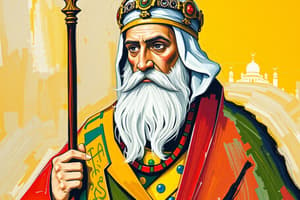Podcast
Questions and Answers
What title did Prophet Muhammad (s) bestow upon Umar ibn al-Khattab (r), reflecting his discerning character?
What title did Prophet Muhammad (s) bestow upon Umar ibn al-Khattab (r), reflecting his discerning character?
- Asadullah (The Lion of God)
- Al-Farooq (The one who distinguishes between right and wrong) (correct)
- As-Siddiq (The Truthful)
- Al-Amin (The Trustworthy)
Why did Umar (r) replace Khalid bin Walid (r) as commander-in-chief despite his successful military track record?
Why did Umar (r) replace Khalid bin Walid (r) as commander-in-chief despite his successful military track record?
- Khalid bin Walid (r) was found to be corrupt
- Khalid bin Walid (r) requested to step down due to old age
- Due to complaints from the army about Khalid bin Walid (r)'s leadership style
- To prevent over-reliance on individuals and reinforce reliance on Allah (SWT) (correct)
Who assembled a powerful army, including war elephants, to target Muslim border towns, leading to the Battle of the Bridge?
Who assembled a powerful army, including war elephants, to target Muslim border towns, leading to the Battle of the Bridge?
- Caliph Umar (r)
- Muthanna (r)
- General Rostam (correct)
- King Yazdegerd III
What was the primary cause of the Muslim army's initial difficulties and significant losses in the Battle of the Bridge?
What was the primary cause of the Muslim army's initial difficulties and significant losses in the Battle of the Bridge?
Which of the following actions did Umar (r) take upon learning about the impending threat from the Persian empire?
Which of the following actions did Umar (r) take upon learning about the impending threat from the Persian empire?
Where did the Battle of the Bridge take place?
Where did the Battle of the Bridge take place?
How did the internal conflicts within the Persian empire inadvertently benefit the Muslims after their defeat in the Battle of the Bridge?
How did the internal conflicts within the Persian empire inadvertently benefit the Muslims after their defeat in the Battle of the Bridge?
Flashcards
Umar ibn al-Khattab (r)
Umar ibn al-Khattab (r)
The second Caliph of Islam following Abu Bakr's death, known for his leadership and fairness.
Title 'Al-Farooq'
Title 'Al-Farooq'
A title given to Umar (r) meaning 'the one who can tell what is right and wrong' due to his strong sense of justice.
Governors in regions
Governors in regions
Umar (r) established governors in different regions for consistent Islamic governance and application of laws.
Army reforms
Army reforms
Signup and view all the flashcards
Khalid bin Walid (r)
Khalid bin Walid (r)
Signup and view all the flashcards
Battle of the Bridge
Battle of the Bridge
Signup and view all the flashcards
Rostam
Rostam
Signup and view all the flashcards
Significance of defeat
Significance of defeat
Signup and view all the flashcards
Study Notes
Umar (r)'s Administration
- Following Abu Bakr (r)'s death, Umar ibn al-Khattab (r) became the second Caliph of Islam.
- Umar (r) was a prominent leader of the Quraysh tribe known for his literacy, diligence, and fairness.
- Prophet Muhammad (s) bestowed upon him the title "Al-Farooq", meaning "the one who can tell what is right and wrong", due to his strong sense of justice.
- With the expanding Muslim empire, Umar (r) established governors in different regions to ensure consistent Islamic governance and laws.
- Umar (r) implemented army reforms to strengthen the Muslim forces.
- Despite Khalid bin Walid (r)'s exceptional military victories, Umar (r) replaced him as commander-in-chief with Abu Ubaidah (r) to emphasize reliance on Allah (SWT) for success.
- Umar (r)'s reforms aimed to prevent over-reliance on individuals and solidify the Muslim community's faith in Allah (SWT).
- The Muslims faced challenges on the Persian front, where the young Persian king Yazdegerd III was ruled by his general Rostam.
- Rostam's anger at the growing number of Persians embracing Islam led to repeated attacks on Muslim border tribes.
- Rostam assembled a powerful army, including war elephants, to target Muslim border towns.
- Muthanna (r), leading a small Muslim army, informed Caliph Umar (r) of the impending threat.
- Umar (r) quickly sent reinforcements.
- The two armies clashed near the Euphrates River, present-day Kufa, Iraq, in a battle known as the Battle of the Bridge.
- The Persians' use of elephants terrified the Muslim horses, causing initial difficulties for the Muslims.
- The Muslims suffered a significant defeat in the Battle of the Bridge, with the loss of almost 10,000 soldiers.
- Despite the setbacks, the surviving Muslims were spared further persecution due to internal conflicts in the Persian empire.
- The Battle of the Bridge marked the first major defeat for the Muslims against the Persians.
- This defeat did not deter the Muslims, who remained confident in their faith and prepared to overcome future challenges.
Studying That Suits You
Use AI to generate personalized quizzes and flashcards to suit your learning preferences.




